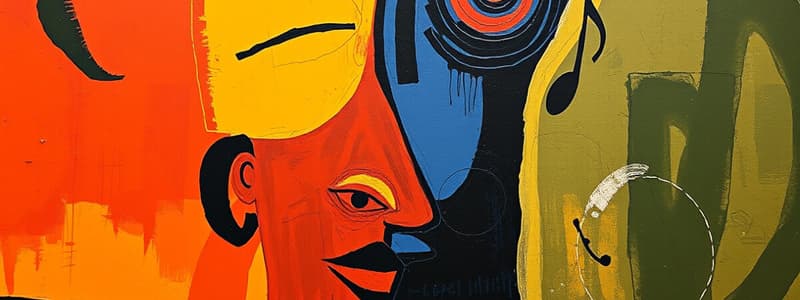Podcast
Questions and Answers
What does Okonkwo do as his 7 years in exile is near the end?
What does Okonkwo do as his 7 years in exile is near the end?
- He builds a new home
- He sacrifices a goat
- He provides a large feast for his mother's kinsmen (correct)
- He returns to Umuofia
What does Okonkwo regret?
What does Okonkwo regret?
The missed opportunity to have further increased his status and influence among his clan.
What do the villagers express to Okonkwo at the feast?
What do the villagers express to Okonkwo at the feast?
He has been generous with his food.
What are Okonkwo's continued concerns?
What are Okonkwo's continued concerns?
Why is Nwoye interested in Christianity?
Why is Nwoye interested in Christianity?
What two groups are happy to become converts to Christianity?
What two groups are happy to become converts to Christianity?
What good reasons does Okonkwo have to reject Christianity?
What good reasons does Okonkwo have to reject Christianity?
Did Okonkwo give up on Nwoye?
Did Okonkwo give up on Nwoye?
What does the phrase, 'Living fire begets cold impotent ash' mean?
What does the phrase, 'Living fire begets cold impotent ash' mean?
What does the arrival of the white colonists weaken?
What does the arrival of the white colonists weaken?
What does the Christian church recognize as an obstacle?
What does the Christian church recognize as an obstacle?
Why does Okonkwo send money to Obierika?
Why does Okonkwo send money to Obierika?
Why is Uchendu honored at the feast?
Why is Uchendu honored at the feast?
What does the phrase, 'I cannot live on the bank of a river and wash my hands with spittle' mean?
What does the phrase, 'I cannot live on the bank of a river and wash my hands with spittle' mean?
When does Okonkwo throw his huge feast?
When does Okonkwo throw his huge feast?
What does Ekwefi provide for the feast?
What does Ekwefi provide for the feast?
What task is given to Ekwefi and Obiageli?
What task is given to Ekwefi and Obiageli?
What is Okonkwo's reasoning for the feast?
What is Okonkwo's reasoning for the feast?
What is the significance of the names Okonkwo gives the children born during his exile?
What is the significance of the names Okonkwo gives the children born during his exile?
Why doesn't Obierika build Okonkwo's obi?
Why doesn't Obierika build Okonkwo's obi?
Why can't Okonkwo return to Umuofia before the rains stop?
Why can't Okonkwo return to Umuofia before the rains stop?
Why does Uchendu throw one of the kola nuts on the ground?
Why does Uchendu throw one of the kola nuts on the ground?
Flashcards are hidden until you start studying
Study Notes
Exile and Cultural Connections
- Okonkwo prepares a feast for his mother's kinsmen in Mbanta to show gratitude after his seven years of exile, inviting all living descendants of an ancestor from two centuries ago.
- He regrets not enhancing his status among the Umuofian community due to forced exile and spending time with those he considers less masculine.
Feast and Community Response
- At the feast, villagers are surprised by Okonkwo's generosity and praise his commitment to kinship.
- Okonkwo worries about the impact of Christianity on younger generations, fearing it diverts them from traditional values and family ties.
Nwoye’s Alienation and Transformation
- Nwoye, feeling disconnected from society due to disbelief in its customs, finds refuge in Christianity, which appeals to outcasts.
- Osu (outcasts) and men without titles convert to Christianity for affirmation and equality, challenging their marginalized status.
Okonkwo’s Rejection of Christianity
- Okonkwo sees Christianity as a threat, as it undermines cultural achievements and reduces the significance of clan leaders and religious authorities.
- He fears that failure to expel missionaries would make his past actions, like the killing of Ikemefuna, feel unjustifiable and personally regrettable.
Hope and Realization
- Despite his disapproval, Okonkwo believes in Nwoye's potential to ascend as a great clansman, reflecting his enduring parental hopes.
- The phrase "Living fire begets cold impotent ash" conveys Okonkwo’s realization that his fierce nature may lead to feelings of coldness and powerlessness in others, including Nwoye.
Kinship and Religion
- The arrival of white colonists and their religion threatens the Igbo kinship system, as Christianity promotes a metaphorical kinship that undermines ancestral ties.
- The Igbo kinship bonds are viewed as a significant barrier to the success of Christian missionaries.
Economic Preparations and Rituals
- Okonkwo sends money to Obierika to rebuild huts of his burned compound in Umuofia, showing concern for his property during exile.
- Uchendu, as the eldest at the feast, leads a prayer after breaking the kola nut, symbolizing respect for health and progeny.
Customs and Symbolism
- Okonkwo's timing for the feast corresponds with the conclusion of the rainy season, emphasizing his eagerness to regain his status.
- Ekwefi and Obiageli are tasked with gathering cassava, a traditional crop essential for the feast preparation.
Naming and Identity
- Okonkwo names his children born during exile with significant names: Nneka ("Mother is Supreme") and Nwofia ("Begotten in the Wilderness"), reflecting complex family ties and feelings about his mother’s home.
- Uchendu honors the ancestors symbolically by throwing a kola nut on the ground during the feast.
Limitations of Existence
- Okonkwo must remain in Mbanta until the rains cease to fulfill the full term of his exile, showcasing the rigid social structures of the time.
- Obierika does not construct Okonkwo's obi as it is customary for men to build or inherit their own living spaces, underlining societal expectations.
Studying That Suits You
Use AI to generate personalized quizzes and flashcards to suit your learning preferences.




